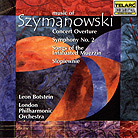March 2001
I’m no great shakes as a musicologist, but even I can hear the influences of those composers on both the "Concert Overture" (written in 1904-5, when Szymanowski was 22, and revised in 1913) and his Symphony No.2 (written in 1910, when he was 28). There is also, it seems to me, a strong helping of Beethoven that permeates this music as well. And yet, for all the influence these men had on Szymanowski, none of the music presented here sounds the least bit derivative. Szymanowski used the ideas of others, but only as a springboard to help in expressing what he wanted to say. The first thing that caught my attention was Szymanowski’s use of different parts of the orchestra to color his music in odd ways. The way Szymanowski changed tempo and melody at whim reminded me of the music of Thelonious Monk. At times the music was both bombastic and smooth, and at others soft and choppy. That sounds contradictory, and yet, if you listen to this music, you’ll realize it’s not. Szymanowski’s compositions contain many twists and turns, they veer first one way and then suddenly take off in another. It makes for a tough listening session -- one that requires serious thought. This is not background music by any stretch of the imagination. The last two pieces, "Songs Of An Infatuated Muezzin" and "Slopiewnie" (Wordsong), are quite simply not my cup of tea. Soprano Zofia Kilanowicz is extremely well recorded, however. If your tolerance for Eastern European vocal music is greater than mine, you’ll like them. If not, the orchestral selections are more than enough to make this disc worthwhile. Sonically this CD, another of Telarc’s DSD recordings, offers a wide and somewhat deep soundstage. Each section of the orchestra is easily differentiated. The strings sound sweet, but with appropriate bite. There is good power to the brass and the percussion. My only complaint is that the bass is a bit weak. It doesn’t lay down a good enough foundation for the orchestra, thereby weakening the overall sound. All in all, though, a very good effort -- one that, while not being demo quality, will nonetheless allow you to enjoy this music. Should you spend your money on this disc? If you consider yourself a musical adventurer who enjoys the discovery of the unknown, then by all means, buy this disc. You won’t be disappointed. And if you’re already familiar with Szyamnowski, then Telarc has presented you an opportunity to hear his music with some of the best sound available. Either way, you win. GO BACK TO: |
 Music of Szymanowski
Music of Szymanowski![[Reviewed on CD]](../format/regcd.gif) Karol
Szymanowski (1882–1932) was a Ukrainian-born composer who, as he matured and
developed musically, looked for and found new inspiration for releasing his creativity. On
this new Telarc CD, we get to hear two of his compositions written while under the
influence of a pair of Germany’s late romantic period best, Richard Wagner and Johann
Strauss, Jr.
Karol
Szymanowski (1882–1932) was a Ukrainian-born composer who, as he matured and
developed musically, looked for and found new inspiration for releasing his creativity. On
this new Telarc CD, we get to hear two of his compositions written while under the
influence of a pair of Germany’s late romantic period best, Richard Wagner and Johann
Strauss, Jr.